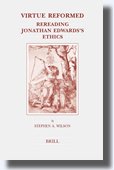Doug Sweeney contemplates sin.
Oliver D. Crisp, Jonathan Edwards and the Metaphysics of Sin (Aldershot, U.K.: Ashgate, 2005).
This is the best work ever written by an analytic philosopher on the thought of Jonathan Edwards. Given the state of the academy, it will not get many readers. It is too philosophically dense for use by most Edwards scholars. But those who invest sufficient time in Crisp’s analysis of Edwards will gain a much more lucid view of Edwards’ metaphysics of sin.
In seven brief chapters on the decrees, Adam’s fall, the so-called authorship of sin, God’s secret and revealed will, temporal parts and imputed sin, inherited guilt, and the problems posed by Edwards’ occasionalism, Crisp marches us through the logic of Edwards’ hamartiology. Along the way, he suggests that Edwards made “highly original contributions to philosophical theology that are far from being facile or merely antique.” Crisp contends, in fact, that Edwards “raise[d] the standard of discussion about this cluster of issues to a new level of limpidity and philosophical acuity. In doing so, he clarified what the central problems are that philosophical theologians need to attend to in their analysis” (p. 1).
Crisp does not simply describe and consent to Edwards’ doctrine of sin. He evaluates it critically, pointing out what he considers to be a number of serious problems. He thinks that Edwards attempted to walk a “fatally flawed” via media in pursuit of predestination, combining a supralapsarian view of God’s election to salvation with an awkward, infralapsarian view of divine reprobation (pp. 5-24). Even worse, according to Crisp, was “Edwards’ endorsement of occasionalism,” the “single greatest flaw in his doctrine of sin” (p. 130). According to Crisp, Edwards’ occasionalism--particularly his notion of recreation ex nihilo—“destroys imputation” (p. 110) and renders God directly responsible for sin. It undermines the force of Edwards’ famous argument in favor of human culpability with respect to original sin. Further, it militates against the rest of his metaphysics of sin, distracting attention from the strengths of his position.
In a brief review like this, one has no space for argumentation. Still, for the sake of promoting discussion on the issues Crisp addresses, I will summarize what I think are some mistakes in his assessment. First, while Crisp deals deftly with Edwards’ doctrine of predestination, even he underestimates its complexity. Like nearly all Edwards scholars who have interpreted this doctrine, Crisp neglects to nail down Edwards’ salient distinction between: 1) God’s supralapsarian decree to communicate His goodness ad extra and to glorify the elect considered in general (i.e. en masse, logically prior to creating them as individual persons); and 2) God’s infralapsarian decree to save the elect as individuals (i.e. considered now as created, fallen, and sinful). It may be that Edwards’ doctrine is “fatally flawed” after all, but not in the way that Crisp suggests. Technically speaking, Edwards remained consistently infralapsarian (in the tradition of Westminster), though Crisp is right to highlight his frequent use of supralapsarian logic. (See esp. “Miscellanies” No. 704, in Works 18: 317-18, where JE specifies that “both the decrees of election and rejection or reprobation, as so styled, must be considered as consequent on the decrees concerning the creation and fall.”) Second, Crisp underestimates Edwards’ Augustinian realism and exaggerates his recourse to occasionalism--especially in his treatment of Edwards’ doctrine of imputation. (For a more balanced interpretation of Edwards’ occasionalism, consult Sang Hyun Lee, The Philosophical Theology of Jonathan Edwards [Princeton, 1988], pp. 47-75, 107.) Third and finally, Crisp’s analysis proves so narrowly philosophical that it could create an impression among the uninitiated that Edwards found it more important to be logically consistent than to be biblically consistent. Perhaps this goes without saying, but Edwards operated mainly as a biblical theologian. He prized fidelity to the wide range of biblical revelation over airtight, systematic coherence.
Despite his reservations regarding Edwards’ view of sin, Crisp concludes his book by offering contemporary Edwardsians a way to move forward with Edwards’ metaphysical project: “where the occasionalism of his developed position fails, a perdurantism [see pp. 104ff.] sans occasionalistic paraphernalia could still provide a broadly Edwardsian account of sin, which is in sympathy with the intentions which lie behind the main structures of his argument for imputation, and which . . . provides an intriguing response to this traditional theological conundrum” (p. 134). Crisp believes that Edwards can serve as a fruitful interlocutor for future Christian philosophical theologians. He appeals to such thinkers to join him in dialogue with Edwards, seeking “resources for addressing contemporary philosophical concerns” (p. 1).
Whether or not they feel the need for such a forward-looking conclusion, Edwards scholars of all kinds will find a rich resource in Crisp. Social and literary historians will want to supplement this book with older works on Edwards and sin by Shelton Smith, Clyde Holbrook, Sam Storms, and Rachel Wheeler (among others). But analytical philosophers who want to engage Edwards can do no better than start with Crisp on Edwards’ metaphysics of sin.
Douglas A. Sweeney
Trinity Evangelical Divinity School
continue reading




